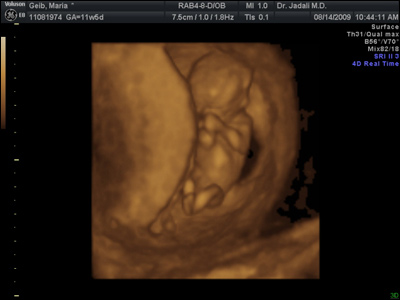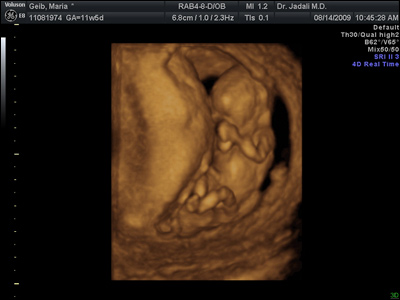
11 weeks, Five Days
Oh, second child of mine! Three weeks until your mother and I can discover your sex.
You are now some three months old, and I for one am impatient to meet and start to get to know you. Your mother has had a different pregnancy than that of your older sister; hormonal surges, nausea followed by hunger and then nausea again – exultation and then crankiness. Whew! But now with your second trimester these discomforts have moderated and we look for calmer seas ahead. There will soon be the “quickening” stage, then viability, felt movement in the womb, and then childbirth. Time will move slowly until finally the last week pass quickly – your mother heavy, swollen, uncomfortable, and ready for it all to be over.
Yes, your parents have done this before; you will not be born to rank, rookie parents, as occurred with your big sister, Julia. We know a thing or two about parenting, and pain and effort have been the price of admittance. But every child is different and difficult, on one way or another, and we are sensitive to perceiving your unique needs and meeting them – but all that will come soon enough.
For now you have just been re-classified from “embryo” to “foetus.” This pregnancy I feel more or less confident in what to do when you are born and our family still possesses the detritus of infancy: bassinets, high chairs, breast pumps, one-sies, etc. So I have hardly opened that hoary classic, What To Expect When You Are Expecting.” (I poured over it the first time.) This pregnancy I have instead read consistently from “The Pregnancy Journal: A Day-to-Day Guide to a Healthy and Happy Pregnancy” by A. Christine Harris which explains on a daily and weekly basis what is happening physically to your body. For example, I read this entry today for your day 101 of pregnancy (165 to go!) that told us the following about you currently:
With the help of the placenta and the umbilical cord, your baby’s system is operating as it will after it’s born. The baby has its own circulation, pumped by the heart, which at this developmental stage pumps the equivalent of 25 quarts of blood (27.5 liters) a day. The placenta helps with protection, digestion, respiration, waste removal, and hormone production. Most bacteria are unable to pass through the placental membrane, but most drugs and medications cross the placenta freely.
I read this last thing in the evening and then let my imagination and subconscious digest the information as I sleep. Laying there late at night I talk to you through your mother’s abdomen: “Good night, little one – grow those little arm buds!” “We can’t wait to meet you!” In reality, parent and child do not start their relationship at birth when they see each other for the first time; rather, they start to get to know each other in a hundred different complicated ways in the months before labor commences.
You will no doubt notice this in the context of this letter, written to you by me on a vacation day – September 7, 2009 – Labor Day – when I find myself free from my students.
I will continue to give your mother loving hugs, rubbing her swelling belly, talking to you at night, reading up on your physical development, reminding Mommy to take her prenatal vitamins at bedtime.
I look forward enormously to that day in early 2010 when you will make your grand arrival. Mommy and I shall bring you forth from the labor and delivery room to present you to your grandparents, Liz, and to your big sister, Julia. It will be a moment of high drama!
And our family will be complete. We can then get onto the business of happily growing and maturing and loving and fighting which is the work of all families.
I cannot wait!
But I will wait, and I will wait patiently.
Love,
Richard James Geib

11 weeks, Five Days


